Episodes
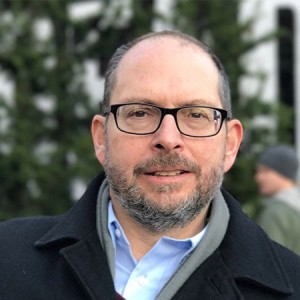
Monday Sep 30, 2019
Episode 079 - Conversion and Witness with Jonathan Lunine
Monday Sep 30, 2019
Monday Sep 30, 2019
- Dr. Jonathan Lunine is the David C. Duncan Professor in the Physical Science and chair of the Department of Astronomy at Cornell University. He is also the vice president and a co-founder of the Society of Catholic Scientists.
- Here is information about the Vatican Observatory. It was one of the starting points for Lunine’s exploration of the compatibility between science and the Catholic faith.
- He met Stephen Barr in 2014, and this led to their discussions about establishing the Society of Catholic Scientists. Here is a talk given by Barr at the University of Chicago.
- Here is a talk by Lunine about Georges Lemaitre, a Catholic priest recognized as an originator of the Big Bang theory. In our conversation, Lunine described a presentation on Lemaitre that he gave at Cornell as a kind of “coming-out party” for him as a Catholic convert with his own story to tell. He has addressed Catholic students with the advice to share one’s faith story but to be judicious, following the practice of St. Paul, who adapted his messages to his audiences. A recommendation for discussions of faith: “There’s a time and a place for everything.”
- Lunine mentioned Elaine Ecklund, who has studied what scientists think about the American culture’s understanding that science and religion are incompatible. Harvard physicist Lisa Randall, who has said belief in God is incompatible with science, is an example of the resistance to faith that many scientists encounter in academia, Lunine said. Our culture gives much credibility to scientists, who owe it to their audiences to be clear about when they are speaking as individuals rather than scholarly experts. Lunine also mentioned the Thomistic Institute, which has a chapter on the Cornell campus founded by a graduate student.
- Part of the difficulty in the dialogue between science and religion is a popular but erroneous view that the Bible was intended to be a book of science. Here is a discussion of St. Augustine’s examination of this claim. Another challenge, Lunine said, is that our children generally grow up without a substantive education in religion.
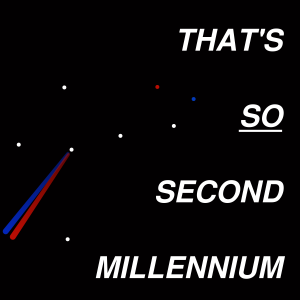
Thursday Aug 29, 2019
Post Christian: The Galileo business in 250 words
Thursday Aug 29, 2019
Thursday Aug 29, 2019
I prepared these notes for an interview with Brigid Ayer on the Faith in Action Show for Catholic Radio Indy, but ended up using almost none of them. We talked instead about matters in the present day, and why Bill (also on the interview) and I started TSSM. The interview is planned to go up the third week of September, with the podcast version of the episode on their PodBean feed Monday the 16th and the radio broadcast later in the week.
The dominant proximate source for this was a blog post or two from the Vatican Observatory blog, which I cannot even find right now, due to a surplus of riches in their coverage of the subject. For your own purposes, there are also a million books. I loved Galileo's Daughter; I haven't yet gotten up the courage to tackle The Galileo Affair: A Documentary History.
Science, Church, Galileo.
The Galileo affair was a messy piece of work, which a number of people, bishops and cardinals included, inside the Church recognized at the time. Galileo himself remained a Catholic and endured his condemnation with irritation as an obvious miscarriage of justice and a misapplication of the Church's own teachings. At the time, his ideas were considered by a number of people to be heretical both because they contradicted simple-minded interpretations of certain passages in the Bible and because, essentially, they contradicted Aristotle.
Aristotle's philosophy is immensely insightful, and continues to be a viable means of interpreting reality, but not all of it equally. The Scholastics had fought a long campaign to integrate Aristotle into the fabric of Christian doctrine, and the result was a beautiful intellectual accomplishment, but it allowed Aristotle to take too much significance even in matters where his thinking is simply not that insightful or valuable. He took the geocentric universe for granted.
When Galileo set out to prove the geocentric model wrong, it was easy for people at that time of religious turmoil to condemn him. On one side, Catholics who were sensitive to the shrill Protestant shrieking about Scripture were not eager to be forced into reading the handful of passages that seem relevant to the issue poetically or figuratively. On the other, in attacking something that Aristotle taught, essential or not to his philosophical framework, Galileo could be read by others to be trying to overturn all of philosophy and theology along with it.
The condemnations of 1633 were never enforced all that rigidly, and during the 18th and 19th centuries the official proscriptions on his thought and writings were loosened. The popes since Leo XIII have piece by piece vindicated Galileo completely, culminating in two statements by John Paul II (in 1991 and 2000, as I recall, and also belonging on the reading list) that said the cardinals and popes in 1613-1633 had made mistakes and been wrong to treat Galileo the way that they did.
The condemnation of Galileo was never a matter of infallible magisterium. The magisterium of the Church is exercised in the matters of faith and morals, not astronomy or philosophy, and not even social science. Further, the trial of an individual is not the sort of place one would look for magisterial teaching. Some of the Ecumenical Councils were called to try heretics like Arius, and those are the very definition of magisterial teaching, but you only get an E.C. called to debate your writings if you have 1) a massive movement, hence your trial is not really about you, but about ideas wandering at large in society and 2) the issue you are leading people on about is actually squarely in the arena of the teachings of the faith.
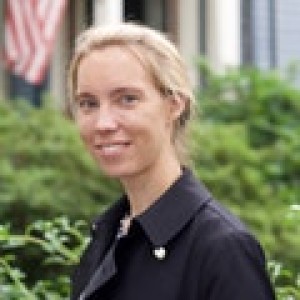
Monday Aug 26, 2019
Episode 074 - Karin Oberg
Monday Aug 26, 2019
Monday Aug 26, 2019
- Karin Öberg is Professor of Astronomy and Director of Undergraduate Studies in the Department of Astronomy at Harvard University. Planetary formation—or stars and stellar evolution—is a focus of her research. She is a member of the Board of Directors of the Society of Catholic Scientists. See her CV here.
- Öberg spoke of her first academic route to astronomy being via chemistry rather than physics. She discovered the field of astrochemistry while an undergraduate at the California Institute of Technology. She earned her PhD in astrophysics at Leiden University in the Netherlands.
- She joined the faculty at the University of Virginia in 2012. One year, later, she received an assistant professorship at the Harvard-Smithsonian Center for Astrophysics, which is located at Harvard.
- Öberg was baptized as a Christian in her youth but then drew away from the faith. She said she never adopted an atheistic, materialistic perspective largely because of two key principles she holds to: moral realism and one’s personal agency as an individual making free decisions.
- During her college years, Christianity remained a living question for her partly because of the friends with whom she associated. Books influenced her deeply: Lord of the Rings, The Screwtape Letters, The Abolition of Man, Mere Christianity, and Orthodoxy. This combination brought her back to Christianity, first in the Anglican Church.
- After joining the faculty at Harvard, she completed a two-year RCIA program at St Paul’s Parish in Harvard Square to join the Catholic Church. One concern she felt in her new Catholic experiences, she said, was that the statements in the Mass did not always seem to line up with personal beliefs articulated by individuals.
- Öberg said she has not personally experienced any bias against her Catholicism at Harvard, and indeed she has felt welcomed in the astronomy community and among other colleagues. She helps to mentor some Catholic and Christian students. Some Catholic colleagues have experienced prejudice, in the biology department, for example. She said one factor is that her research does not touch on any controversial subjects. But she wants to let students know they should not be anxious about living out their Catholic faith because of fear of prejudiced encounters. Overall, being open about one’s faith has a net positive effect on oneself and others, despite occasional crosses one might have to bear.

Monday Aug 19, 2019
Episode 073 – Jonathan Lunine
Monday Aug 19, 2019
Monday Aug 19, 2019
In this episode we have Jonathan Lunine on the podcast, this time talking to him about his own spiritual journey from Judaism to Catholic Christianity, and from the secular surface of life as a scientist to a deeper life where the beauty of science is one prominent part of a larger whole of human experience. We also get the chance to discuss some of his work in studying the planets during the era when they changed from objects seen through a telescope to worlds we can map and even sample and bring back to our laboratories.
- Jonathan Lunine, a planetary scientist at Cornell University, is a member of the board of the Society of Catholic Scientists. He spoke of the influence of reading Carl Sagan’s The Cosmic Connection and receiving Sagan’s advice for pursuing a career in astronomy.
- Dr. Lunine has been on the scientific teams leading several missions of space exploration, including Cassini and, now, the James Webb Space Telescope.
- He described his early spiritual journey, seeing how science and religion could be intertwined. The journey took him from Jewish family roots to a Methodist church and then to Catholicism. He spoke of being impressed by the connection between the Catholic faith and its Jewish roots.
- Astronomers have been excited to learn of the abundance of planets to be found in our galaxy. As Dr. Lunine pointed out, thanks to initiatives like the New Horizons spacecraft, we have turned our “cosmic backyard” into a place where we can study an enormous variety of geology “and even, potentially, biology.”
- He expressed gratitude for astronomers and others who became role models embracing the compatibility between science and faith. A key figure, about whom he has made presentations, is the Belgian priest Georges LeMaitre, known as the father of the big bang theory.
This was one of our most enjoyable conversations, and we definitely hope to have Dr. Lunine back on the podcast again.
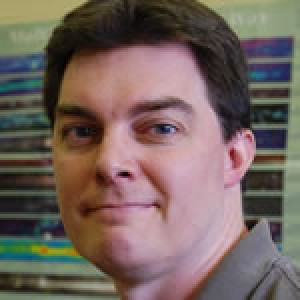
Monday Jul 22, 2019
Episode 069 - Fr. Lawrence Machia OSB and Daniel vanden Berk, part II
Monday Jul 22, 2019
Monday Jul 22, 2019
- For background on Fr. Machia and Dr. Vanden Berk and this interview, see the show notes for Episode 68.
- In Episode 69, we mentioned approvingly one of the many books about Galileo, who was central to Fr. Machia’s talk at the conference. The book is Galileo’s Daughter. Contrary to a still-commonplace assumption in popular culture and the average person’s understanding of history, Galileo did not see his life as one centered on conflict with the Catholic Church.
- People’s instincts to see a huge conflict between science and religion in our own time deserve to be taken seriously. Co-host Paul points out that, even in his youth, he was interested in the polemic potential between his faith and his interest in geology. This was crystallized (no pun intended) by his reading of Great Geological Controversies, published in 1983 by Oxford University Press. It identified challenges—among scientists themselves—which were raised to previous understandings in geology.
- How can scientists of faith, such as the members of the Society of Catholic Scientists, play a role in addressing the conflict between science and religion as it exists today? They can act as witnesses to the compatibility of the two fields of knowledge in their own lives, said Dr. Vanden Berk.
- Fr. Machia pointed out that, as expressed by Saint John Paul II, one key to the compatibility is that one discipline does not pretend to do what the other does. Don’t read the Bible as a science text, he said, since science is not what the Bible is about; it spends a relatively tiny amount of time on subjects that might be construed to be science-focused. The two fields of knowledge have their own distinct competencies.
- Saint John Paul II wrote about the compatibility of science and religion. Here’s an essay by noted bioethicist Father Tad Pacholczyk on the subject, drawing from John Paul’s insights.
- As Fr. Machia points out with reference to the insights of Pope John Paul, one area of relationship between the disciplines of science and religion is the subject of ethics. After all, what’s the point of doing anything, like scientific research, if you’re not thinking about why you’re doing it? In the case of science, humans confront issues of power over creation—and how to exercise that power. That answer is informed by how we see our humanity, and that question was exactly the topic of the SCS conference at which we held this podcast discussion.
- Galileo himself wrote about the compatibility of these fields of knowledge in his letter to Madame Christina of Lorraine in 1615. Here’s an essay discussing that letter.
Times continue from the Episode 68 listing.
28:00 Galileo's Daughter
30:00 Biblical minimalism
32:00 Geological arguments about the Flood
34:00 Conflict thesis persistence; Daniel another who never saw the conflict
36:00 Need to teach the contemporary theory, wherever our religious theories place us
37:00 Contributions of Catholic scientists to the future of science: need to respect the "volume argument"
38:00 Galileo on the Bible as not an astronomy textbook
40:00 Past, present and future of science
42:00 Wrapup
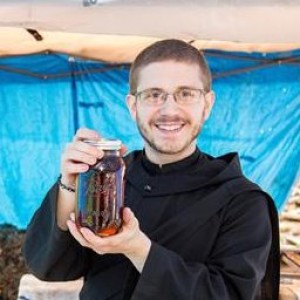
Monday Jul 15, 2019
Episode 068 - Fr. Lawrence Machia OSB and Daniel vanden Berk, part I
Monday Jul 15, 2019
Monday Jul 15, 2019
- Father Lawrence Machia, OSB, is a Benedictine monk at St. Vincent College and Archabbey in Latrobe, PA. The public can view his 2019 Society of Catholic Scientists presentation on You Tube.
- Father Machia’s talk made reference to Galileo’s letter to Benedetto Castelli.
- Dr. Daniel Vanden Berk is an associate professor of physics at St. Vincent College.
- Fr. Machia and Dr. Vanden Berk, both very interested in astronomy, have worked together on designing planetarium shows on the St. Vincent campus. They have always seen the complementarity of science and religion, faith and reason, in contrast to many people’s rejection of religion based on supposed conflicts with scientific, rational, experiential learning.
- Dr. Vanden Berk was intrigued at an early age by the “Cosmos”- series presented on PBS by Carl Sagan, but the program posited a conflict between science and faith.
- Among Dr. Vanden Berk’s astronomical adventures: working on the Sloan Digital Sky Survey. He has worked with the Fermi National Accelerator Laboratory, processing data captured by the Digital Sky Survey.
Episode timeline:
3:00 Machia's time in college, science to theology
5:00 Machia's beginning to discern a religious vocation
8:00 St. Vincent College and the archabbey
10:00 Pre-novitiate and novitiate
12:00 Vows
15:00 Why TSSM, following on from Lawrence's plans to finish and continue his physics education
16:00 Begin vanden Berk
18:00 Sci-fi influences
20:00 He and his wife's discernment process
22:00 Daniel's early career, the early Hubble mission
24:00 Sky surveys
26:00 Texas sky survey
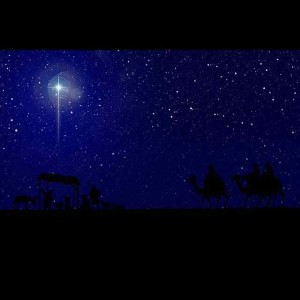
Monday Dec 24, 2018
Episode 039 - Star of Bethlehem
Monday Dec 24, 2018
Monday Dec 24, 2018
In this episode we try to give a little workshop on thinking for yourself about a thorny passage in the Bible, specifically what we are to make of this star that supposedly influenced the Magi (wizards? astrologers?) from "the east" to come to Jerusalem looking for Jesus.
Read the rest of this entry »
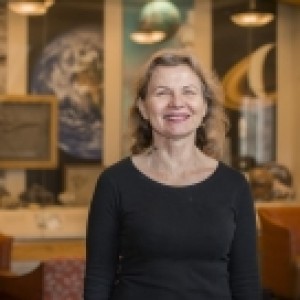
Monday Dec 03, 2018
Episode 036 - Anne Hofmeister on Galactic Rotation, Math, and Glass
Monday Dec 03, 2018
Monday Dec 03, 2018
The times below are continuations from the last episode. My opening is about 1:30, and then we start with galaxy motions at "26:00".
26:00 Galaxy motions
27:00 Galaxy rotation curves: do not match Keplerian orbits
28:00 Galaxies spin more like records (laggy soft records); mass distribution is nothing like the Solar System
29:00 Hurricanes as a better analogy for galaxies
30:00 Stars in a galaxy move in local organization
32:00 Nebulas
34:00 The opposite extreme: rigid body rotation
35:00 Gravitational attraction between stars creating coherence
36:00 Curiosity that gravity and electrical forces are both inverse square laws
37:00 Poisson's equation
38:00 Summing densities in Poisson's inhomogeneous term is physically meaningless; intensive quantities can't be summed that way
40:00 Gauss' theorem: flux through a surface and quantity within a volume
41:00 Summing is for extensive variables
42:00 Pressure an ambiguous variable
43:00 Future work
44:00 Thermal expansivity: Giauque
45:00 Problems with the glass transition measurements done in the past: need to completely drive out water from the experimental charges
48:00 Wrapup

